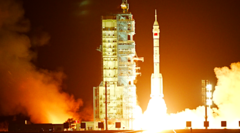Amid celebrations, China hailed the successful launch and docking of the Shenzhou 19 spacecraft, which carried a three-member crew to the Tiangong space station. This historic mission features the country's first female space engineer, Wang Haoze, highlighting a new generation of taikonauts born in the 1990s who will stay in space for six months to carry out experiments and undertake spacewalks. China's aspirations for space are significant, aiming to reclaim its standing as a preeminent global space power by eventually sending humans to the Moon by 2030.
The launch event in Gansu Province captured the enthusiasm of hundreds who gathered to cheer the astronauts as they embarked on their journey. Dictated by President Xi Jinping's vision for a robust space program, the successful mission represents just one of over 100 planned launches within a year filled with space exploration endeavors. This points towards a broader competition as China strives to overshadow the United States, which has long been seen as a leader in space technology.
NASA has expressed growing concerns regarding China's ambitions, with warnings from officials about the potential militarization of space and the strategic implications of Beijing's advancements. NASA Administrator Bill Nelson has characterized the ongoing developments as a modern-day space race, highlighting fears of territorial claims on the Moon, where significant resources lie untapped.
Despite the geopolitical tension, within China, the Taikonauts' mission is being celebrated as a source of national pride and technological progress. The crew shared their dreams and aspirations, reinforcing the narrative of China's commitments to scientific exploration and international cooperation in space. Yet, amid this positivity, there exists a recognition of challenges ahead, including the complexities of lunar missions and the need for continued technological advancement.
Chinese narratives, presented through state-controlled media, tend to downplay competition with the US. Notable figures in China's space community express their desire for peaceful exploration and international collaboration. However, fear persists in the US over China's potential possession of resources on the Moon, which could precipitate a continuing arms race - this time extending beyond Earth.
While Beijing positions itself as a beacon of scientific progress, the trajectory of its space program signals a delicate balance of pride and caution. A reality exists that the race for lunar supremacy is more than just exploration; it is intertwined with national interests, economic motivations, and the undercurrents of rivalry between global powers. As these two nations set their sights beyond Earth, the international implications of their actions will likely shape the future of space exploration and geopolitical relations for years to come.
The launch event in Gansu Province captured the enthusiasm of hundreds who gathered to cheer the astronauts as they embarked on their journey. Dictated by President Xi Jinping's vision for a robust space program, the successful mission represents just one of over 100 planned launches within a year filled with space exploration endeavors. This points towards a broader competition as China strives to overshadow the United States, which has long been seen as a leader in space technology.
NASA has expressed growing concerns regarding China's ambitions, with warnings from officials about the potential militarization of space and the strategic implications of Beijing's advancements. NASA Administrator Bill Nelson has characterized the ongoing developments as a modern-day space race, highlighting fears of territorial claims on the Moon, where significant resources lie untapped.
Despite the geopolitical tension, within China, the Taikonauts' mission is being celebrated as a source of national pride and technological progress. The crew shared their dreams and aspirations, reinforcing the narrative of China's commitments to scientific exploration and international cooperation in space. Yet, amid this positivity, there exists a recognition of challenges ahead, including the complexities of lunar missions and the need for continued technological advancement.
Chinese narratives, presented through state-controlled media, tend to downplay competition with the US. Notable figures in China's space community express their desire for peaceful exploration and international collaboration. However, fear persists in the US over China's potential possession of resources on the Moon, which could precipitate a continuing arms race - this time extending beyond Earth.
While Beijing positions itself as a beacon of scientific progress, the trajectory of its space program signals a delicate balance of pride and caution. A reality exists that the race for lunar supremacy is more than just exploration; it is intertwined with national interests, economic motivations, and the undercurrents of rivalry between global powers. As these two nations set their sights beyond Earth, the international implications of their actions will likely shape the future of space exploration and geopolitical relations for years to come.



















